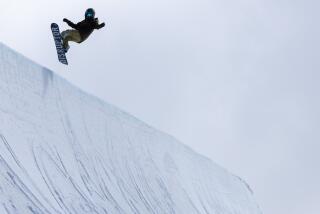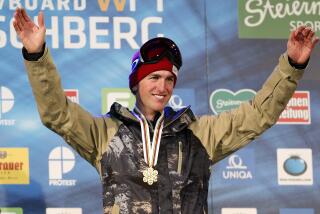Sarah Burke dies at 29; Canadian skier was freestyle halfpipe star
- Share via
Canadian skier Sarah Burke, a leading pioneer of the freestyle halfpipe and the best-known athlete in her sport, died Thursday, nine days after crashing at the bottom of the superpipe during a training run in Utah. She was 29.
Burke, who was a driving force behind the inclusion of the halfpipe in the 2014 Winter Olympics, was injured Jan. 10 while training at Park City Mountain resort.
Tests revealed that she sustained “irreversible damage to her brain due to lack of oxygen and blood after cardiac arrest,” according to a statement released on behalf of her family. She died at University of Utah Hospital in Salt Lake City.
Burke had been favored to win gold at the Winter X Games, set to start next week in Aspen, Colo., and in 2014 when her sport debuts at the Winter Olympics in Sochi, Russia.
A four-time Winter X Games champion, Burke crashed on the same halfpipe where snowboarder Kevin Pearce suffered a traumatic brain injury during a training accident on Dec. 31, 2009.
She was a daredevil who set the standard for skiing in the superpipe, a sister sport to the more popular snowboarding brand that has turned Shaun White and others into stars.
Freeskiers have “a desire to push the envelope,” Jeff Schmuck, managing editor of Newschoolers.com, the online home for freeskiing, told the Toronto Star last week. “Sarah’s been pushing the envelope for 10 years.”
Aware of the importance that the Olympics played in pushing the Whites of the world from the fringes into the mainstream, Burke lobbied to add superpipe skiing to the Games.
“She was a great, positive person for the whole team, the whole sport,” said David Mirota, the Canadian freestyle team’s high performance director.
Jeremy Forster, program director for U.S. Freeskiing and U.S. Snowboarding, said freeskiers would remember Burke “first, as a friend, and then as a competitor who constantly inspired them to do great things.”
Her death is certain to reignite the debate over safety on the halfpipe.
In events like freestyle halfpipe, where the athletes are on two skis — rather than a single, wider board — skiers continually push the envelope on tricks to earn more points and dazzle judges and audiences.
That means flying up and down the icy, 22-foot-high walls of the pipe to generate enough speed and energy for tricks like the 1080, which is three full revolutions in the air. Burke was the first woman to land a 1080 in competition.
“We do everything we can to minimize the risks by wearing protective gear, making sure we are as prepared as possible physically and mentally and bringing the tricks from trampolines onto air bags and ultimately onto the snow,” said Mike Jankowski, head coach of the U.S. snowboard and freeskiing teams.
The air bags, similar to those used in Hollywood stunts, become landing area for athletes as they practice new tricks.
“Sarah was one of the first women to complete many of the most difficult tricks in the halfpipe,” Jankowski said. “She was a leader and an innovator and an inspiration to men in the sport as well as women.”
In 2009, Burke broke a vertebra in her back after landing awkwardly while competing in slopestyle at the X Games. Her lobbying helped get slopestyle — where riders shoot down the mountain and over “features” including bumps and rails — into the X Games.
She felt compelled to compete after advocating for slopestyle even though it was not her best event.
“I’ve been very lucky with the injuries I’ve had. It’s part of the game,” she said in 2010. “Everybody gets hurt.... I’d probably do the exact same thing again.”
A year after that injury, she returned and continued to compete at the highest level.
“Her legacy,” Jankowski said, “will be ingrained in the sport forever.”
Burke was born Sept. 3, 1982, in Barrie, Ontario, and called Squamish, British Columbia, her hometown. At 17, she started skiing on the halfpipe in Whistler in British Columbia.
On the Canadian Freestyle Ski Assn. website, Burke listed her childhood ambition as becoming “an Olympian — in any sport.”
In 2010, she married another freestyle skier, Rory Bushfield, and the couple appeared in a documentary film called “Winter” that aired on the Ski Channel. She lived near Whistler.
While reflecting on the niche she’d carved out in action sports, Burke said two years ago: “We’re all doing this, first off, because we love it and want to be the best.”
Philip Hersh of the Chicago Tribune contributed to this report.
More to Read
Start your day right
Sign up for Essential California for the L.A. Times biggest news, features and recommendations in your inbox six days a week.
You may occasionally receive promotional content from the Los Angeles Times.





















































